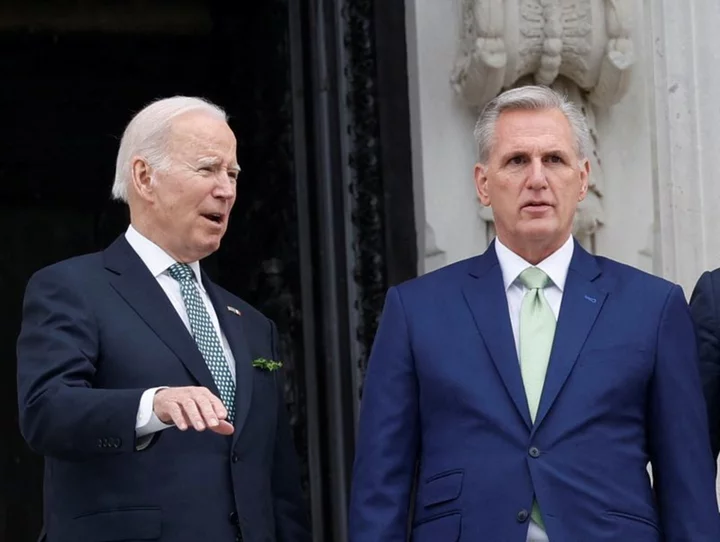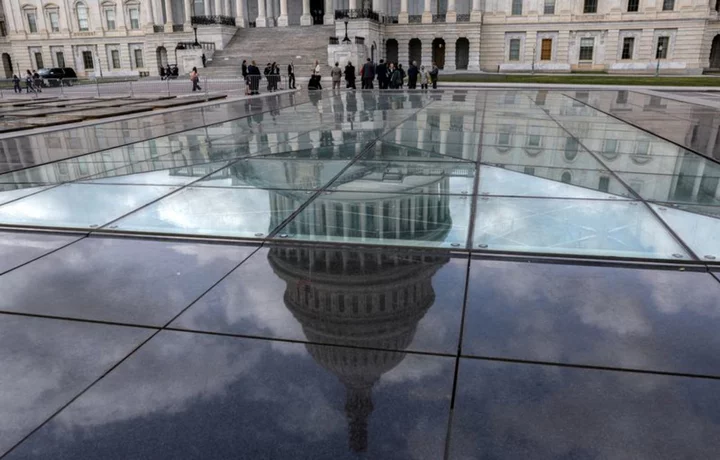By Jarrett Renshaw
WASHINGTON U.S. President Joe Biden and House Republican Speaker Kevin McCarthy are nearing a deal to lift the debt ceiling that would trim some U.S. federal spending.
While talks are fluid, the general contours of the deal have taken shape. Here's what we know so far:
A CAP ON DISCRETIONARY SPENDING
The deal under consideration would lift the debt ceiling in exchange for holding non-defense discretionary spending around current year levels.
The U.S. government will spend $936 billion on non-defense discretionary spending in 2023, the Office of Management and Budget estimates, money that goes to housing, education, road safety and other federal programs.
Keeping this figure roughly flat for two years is the equivalent of a cut, given inflationary impacts, Democrats say.
A BREATHER FOR THE 2024 ELECTION
The debt limit extension could last through 2024, which would mean Congress would not need to address the limit again until after the presidential election.
This would prevent another political showdown that rattles global investors and markets until either a Republican is elected president or Biden wins a second term.
INCREASED DEFENSE SPENDING
The deal under consideration could boost defense spending to around $885 billion, in line with Biden's 2024 budget spending proposal.
That's an 11% increase from the $800 billion allocated in the current budget.
MOVING SPECIAL IRS FUNDING
Biden and Democrats secured $80 billion in new funding for a decade to help the IRS enforce the tax code for wealthy Americans in last year's Inflation Reduction Act, a move the administration said would yield $200 billion in additional revenue over the next 10 years.
The deal would transfer most of that funding, which was allocated under the act as "mandatory spending" to keep it from the political fighting of the annual budgeting process, to "discretionary spending" to be allocated by Congress.
The IRS planned to use the money to hire thousands of new agents, and the extra tax revenue they generated was expected to offset a slew of climate-friendly tax credits. Republicans have argued that auditors will eventually come after middle-class Americans, although the Treasury and Biden said they would focus on high-earning households.
COVID CLAWBACK
Biden and McCarthy are expected to agree to clawback unused COVID relief funds as part of the budget deal, including funding that had been set aside for vaccine research and disaster relief. The estimated amount of unused funds is between $50 and $70 billion.
WORK REQUIREMENTS
Biden and McCarthy have been discussing tightening work requirements for low-income Americans to access food and other social programs, but common ground has been hard to find.
The discussions have been largely focused on the Supplemental Nutrition Assistance Program (SNAP), the federal nutrition assistance program that reaches over 40 million people, and Temporary Assistance for Needy Families (TANF), a time-limited program that helps families with children when parents or other relatives cannot provide basic needs.
The idea faces stiff opposition from progressive members of Biden's Democratic Party, who have already said they wouldn't support a deal that had such a move.
ENERGY PERMITTING
A plan to make it easier for energy projects - including fossil-fuel based ones - is expected to be part of any budget deal. McCarthy and Republicans have identified it as one of the pillars of any deal and the White House threw its support behind the plan earlier this month.
However, the two sides are still working out the final details.
A bill that would boost power transmission between U.S. regions is being considered as part of talks, Reuters reported on Thursday. The measure could be paired with slight changes to the bedrock U.S. environmental law, the National Environmental Policy Act, or NEPA, that governs environmental reviews of projects such as roads and pipelines.
(Reporting By Jarrett Renshaw; Additional reporting by Trevor Hunnicutt; Editing by Heather Timmons and Andrea Ricci)









